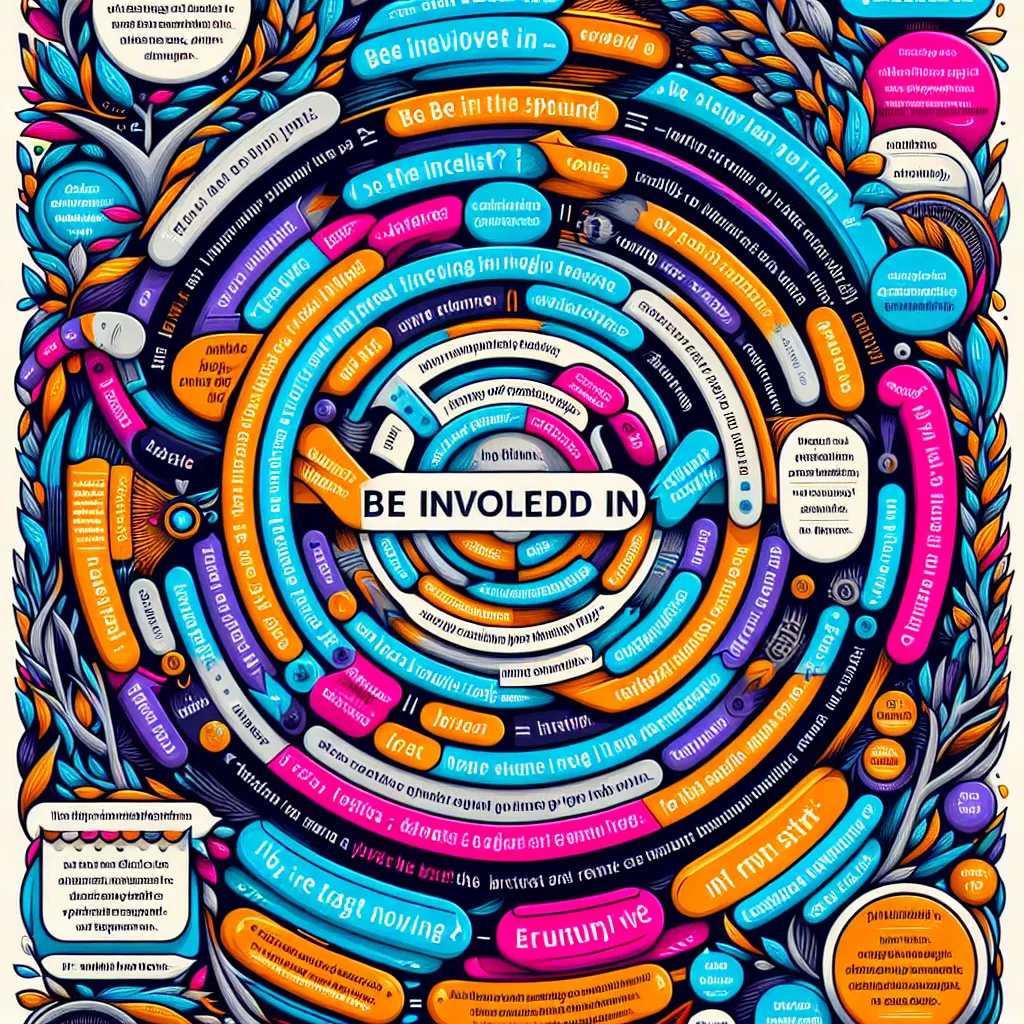The “be involved in + noun/gerund” structure is a crucial grammatical pattern that frequently appears in IELTS exams. Understanding and using this structure effectively can significantly enhance your performance across all sections of the test. Let’s delve into its meaning, usage, and application in IELTS contexts.
Understanding the “Be Involved In + Noun/Gerund” Structure
The phrase “be involved in” is commonly used to describe participation or engagement in an activity, project, or situation. It’s a versatile structure that can be followed by either a noun or a gerund (verb + -ing form used as a noun).
Formula: Subject + be (conjugated) + involved in + noun/gerund
Examples:
- She is involved in organizing the community event.
- They were involved in the research project for years.
- I have been involved in volunteering at the local shelter.
- The company is involved in developing sustainable energy solutions.
- Students are involved in various extracurricular activities.

Significance in IELTS and Frequency of Appearance
The “be involved in” structure is particularly relevant for IELTS candidates as it allows them to express participation and engagement in various contexts. This structure frequently appears in:
- IELTS Speaking: When discussing personal experiences, work, or studies.
- IELTS Writing Task 2: Useful for elaborating on social issues, personal opinions, and trends.
- IELTS Listening: Often used in conversations about work, education, or community activities.
- IELTS Reading: Appears in passages about research, social trends, or organizational descriptions.
Application in IELTS Speaking
In the Speaking test, you can use this structure to talk about your experiences, interests, or activities. For example:
- “I’ve been involved in various volunteer projects over the years.”
- “At university, I was involved in organizing cultural events.”
- “Currently, I am involved in a research project on climate change.”
These sentences demonstrate your ability to use complex structures and discuss your experiences in detail, which can help you achieve a higher band score.
Utilization in IELTS Writing
For Writing Task 2, the “be involved in” structure can be particularly useful when discussing social issues or proposing solutions. Consider this paragraph:
“Many young people today are involved in environmental activism. They are involved in organizing protests, running awareness campaigns, and being involved in local conservation efforts. This level of involvement suggests that the younger generation is deeply concerned about the future of our planet.”
This example showcases how the structure can be used to develop ideas and provide supporting details in an essay.
Advanced Usage and Variations
To achieve higher band scores in IELTS, it’s important to use this structure accurately and with some variation. Here are some advanced uses:
- Passive voice: “The project was involved in by experts from various fields.”
- Negative form: “He isn’t involved in the decision-making process.”
- Questions: “How long have you been involved in this field of study?”
- With modifiers: “She is actively involved in promoting education for underprivileged children.”
- Comparative structures: “I am more involved in community service now than I was last year.”
Common Mistakes and How to Avoid Them
IELTS candidates often make mistakes when using this structure. Here are some common errors and how to correct them:
-
Incorrect preposition:
- Incorrect: “He is involved on the project.”
- Correct: “He is involved in the project.”
-
Using the wrong form after “in”:
- Incorrect: “She is involved in to organize the event.”
- Correct: “She is involved in organizing the event.”
-
Forgetting to conjugate “be”:
- Incorrect: “They be involved in the research.”
- Correct: “They are involved in the research.”
-
Overuse in writing:
- Avoid repetitive use of “be involved in” in your essays. Use synonyms or rephrase sentences for variety.
-
Incorrect tense:
- Incorrect: “I am involved in the project since last year.”
- Correct: “I have been involved in the project since last year.”
Strategies for High Band Scores
To achieve a high band score in IELTS, consider these strategies when using “be involved in”:
-
Use it in complex sentences: “While being involved in my studies, I also am involved in part-time work to gain practical experience.”
-
Combine with other advanced structures: “Having been involved in various research projects, I understand the importance of collaboration in scientific endeavors.”
-
Use it to introduce examples: “Many professionals are involved in continuous learning, for instance, attending workshops or pursuing online courses.”
-
Incorporate it into your personal examples: “In my experience of being involved in international projects, I’ve learned the value of cross-cultural communication.”
-
Use it to discuss trends or changes: “Over the past decade, more companies have become involved in corporate social responsibility initiatives.”
Conclusion
Mastering the “be involved in + noun/gerund” structure is crucial for IELTS success. It allows you to express engagement and participation effectively across all sections of the test. Remember to practice using this structure in various contexts and tenses, and always aim for accuracy and natural usage. By incorporating this structure into your IELTS preparation, you’ll be well-equipped to demonstrate your language proficiency and achieve your desired band score.
For further practice, try using this structure when discussing topics like environmental issues, educational experiences, workplace scenarios, or community involvement. These are common themes in IELTS exams where the “be involved in” structure can be particularly relevant and impactful.